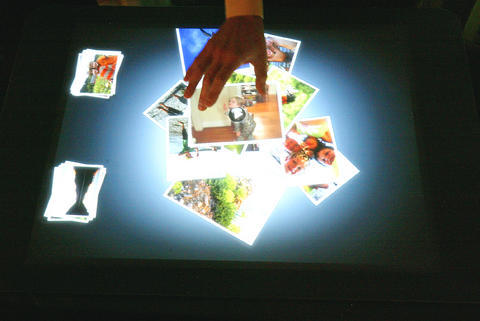Having just tried its hand at developing a digital music player, Microsoft Corp is working on something new: digital furniture.
The company unveiled a computing device yesterday called Microsoft Surface, featuring a 30-inch screen embedded in an acrylic tabletop. The device's electronic guts are hidden in the low-slung table's thick pedestal.
At first glance, Surface is reminiscent of an old-fashioned arcade game table around which patrons played Pac-Man. But there is no joystick here and no mouse or keyboard either. The device is controlled by touching the tabletop display.

PHOTO: AP
Microsoft said this touch screen will allow people to "interact with digital content the same way they have interacted with everyday items such as photos, paintbrushes and music their entire life: with hands, with gestures and by putting real-world objects on the surface."
For example, when a digital camera with Wi-Fi capabilities is placed on the display, the table recognizes the camera and, at a touch of the screen, downloads its photos and video clips. The digital pictures can be sorted and sized by "handling" them as if they were physical prints.
The device uses cameras under the display to detect touches and unlike traditional touch screens it can handle multiple touches at the same time, said Jeff Gattis, the director of product management for Surface.
Surface can read bar codes and tags embedded in objects like hotel chain membership cards.
Microsoft hopes this technology will someday be common in homes, but its first uses will be commercial. By the end of this year, Surface will appear in hotels, restaurants, retail stores and public entertainment sites, where it will serve as an information kiosk and handle things like basic customer service.
Microsoft chief executive Steven Ballmer unveiled the product yesterday at the "D: All Things Digital" conference in Carlsbad, California.
"With Surface, we are creating more intuitive ways for people to interact with technology," Ballmer said in a statement. "We see this as a multibillion-dollar category and we envision a time when surface computing technologies will be pervasive, from tabletops and counters to the hallway mirror."
Microsoft named partners that will be among the first companies to use Surface, including Harrah's Entertainment, Starwood Hotels and Resorts Worldwide and T-Mobile USA.

CHIP WAR: The new restrictions are expected to cut off China’s access to Taiwan’s technologies, materials and equipment essential to building AI semiconductors Taiwan has blacklisted Huawei Technologies Co (華為) and Semiconductor Manufacturing International Corp (SMIC, 中芯), dealing another major blow to the two companies spearheading China’s efforts to develop cutting-edge artificial intelligence (AI) chip technologies. The Ministry of Economic Affairs’ International Trade Administration has included Huawei, SMIC and several of their subsidiaries in an update of its so-called strategic high-tech commodities entity list, the latest version on its Web site showed on Saturday. It did not publicly announce the change. Other entities on the list include organizations such as the Taliban and al-Qaeda, as well as companies in China, Iran and elsewhere. Local companies need

CRITICISM: It is generally accepted that the Straits Forum is a CCP ‘united front’ platform, and anyone attending should maintain Taiwan’s dignity, the council said The Mainland Affairs Council (MAC) yesterday said it deeply regrets that former president Ma Ying-jeou (馬英九) echoed the Chinese Communist Party’s (CCP) “one China” principle and “united front” tactics by telling the Straits Forum that Taiwanese yearn for both sides of the Taiwan Strait to move toward “peace” and “integration.” The 17th annual Straits Forum yesterday opened in Xiamen, China, and while the Chinese Nationalist Party’s (KMT) local government heads were absent for the first time in 17 years, Ma attended the forum as “former KMT chairperson” and met with Chinese People’s Political Consultative Conference Chairman Wang Huning (王滬寧). Wang

CROSS-STRAIT: The MAC said it barred the Chinese officials from attending an event, because they failed to provide guarantees that Taiwan would be treated with respect The Mainland Affairs Council (MAC) on Friday night defended its decision to bar Chinese officials and tourism representatives from attending a tourism event in Taipei next month, citing the unsafe conditions for Taiwanese in China. The Taipei International Summer Travel Expo, organized by the Taiwan Tourism Exchange Association, is to run from July 18 to 21. China’s Taiwan Affairs Office spokeswoman Zhu Fenglian (朱鳳蓮) on Friday said that representatives from China’s travel industry were excluded from the expo. The Democratic Progressive Party government is obstructing cross-strait tourism exchange in a vain attempt to ignore the mainstream support for peaceful development

DEFENSE: The US would assist Taiwan in developing a new command and control system, and it would be based on the US-made Link-22, a senior official said The Ministry of National Defense is to propose a special budget to replace the military’s currently fielded command and control system, bolster defensive resilience and acquire more attack drones, a senior defense official said yesterday. The budget would be presented to the legislature in August, the source said on condition of anonymity. Taiwan’s decade-old Syun An (迅安, “Swift Security”) command and control system is a derivative of Lockheed Martin’s Link-16 developed under Washington’s auspices, they said. The Syun An system is difficult to operate, increasingly obsolete and has unresolved problems related to integrating disparate tactical data across the three branches of the military,